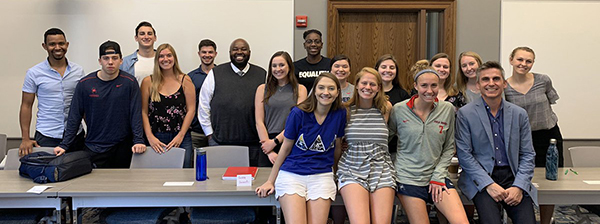
Yesterday we celebrated with educators throughout Richmond and Virginia when Richmond Public Schools high school teacher Rodney Robinson was named the 2019 National Teacher of the Year. Only a week ago, Mr. Robinson was speaking to Jepson School of Leadership Studies students in Dr. Tom Shields’ Education and Equity class about the need to combat educational inequities—something he knows a lot about.
The veteran educator has been teaching in high-poverty schools for 19 years, including since 2015 at Virgie Binford, a public school located in the city’s juvenile detention center. For him, the term poverty-to-prison pipeline more aptly describes the phenomenon affecting many American public school students than school-to-prison pipeline.
Mr. Robinson’s determination to disrupt the poverty-to-prison pipeline was on full display during a CBS interview yesterday. He told the CBS reporters that low-income students need two things to succeed: the necessary resources and culturally relevant teachers who look like them and can inspire them. He said he will use his platform as National Teacher of the Year to obtain more educational resources for high-poverty schools and to recruit more minority teachers, particularly African-American male teachers.
“Big Rob,” as his students fondly refer to him, has introduced innovative, participatory teaching practices in his classroom, with the end goal of graduating students who are, in his words, “socially conscious citizens.”
At the Jepson School, we are also committed to graduating students who are socially conscious citizens. To do this, our faculty employ many of the same creative, high-impact teaching techniques Mr. Robinson uses with his students: They facilitate classroom debate on topical, often controversial issues. They push our students to apply an ethical lens when analyzing and addressing systemic inequities and encourage them to think critically about some of society’s most challenging issues. And, like Mr. Robinson, they form strong bonds with their students.
Often, faculty members invite leadership practitioners—people like Mr. Robinson—to speak to their classes about complex societal issues. Some leadership studies classes have a service-learning component that requires our students to volunteer in the community. In this way, students experience firsthand how the social justice issues and public policies they discuss in the classroom are playing out in schools, detention centers and jails, and social services nonprofits and agencies.
Inspired by what they have learned at the Jepson School, several of our 2019 graduates will tackle education inequities after graduation. Three will become classroom teachers in high-poverty schools—two with Teach for America and one with New York City’s Success Academy. Another will work for the Princeton University Preparatory Program, a rigorous academic and cultural enrichment program that supports high-achieving, low-income high school students. Yet another will pursue a master’s in public policy, with a focus on education, at the University of Chicago.
Leadership in the classroom has the power to challenge, inspire, and promote positive social change for generations of students. We see this every day at the Jepson School.
Photo: Mr. Rodney Robinson, sixth from left, was the guest speaker last Thursday in the leadership studies class Education and Equity, taught by Dr. Tom Shields, second from right.
